-
 Art of Wellness Acupuncture & Traditional Chinese Medicine (TCM)11704 Wilshire Blvd, Suite 295, Los Angeles, CA, 90025
Art of Wellness Acupuncture & Traditional Chinese Medicine (TCM)11704 Wilshire Blvd, Suite 295, Los Angeles, CA, 90025
myartofwellness@gmail.com310-451-5522 Office Hours
MonClosedTue7:30 am --4 pmWed7:30 am --4 pmThu7:30 am -- 4 pmFri7:30 am -- 4 pmSat7:30 am -- 4 pmSunClosedOur office opens from Tuesdays to Saturdays 7:30 am to 4 pm, will be closed on Memorial day, Independent day, Labor day, Thanksgiving day, Christmas and New year.
-
Recent Posts
- How to Treat Chronic Kidney Disease (CKD) With Acupuncture and TCM
- How to Treat Edema With Acupuncture and TCM
- How to Treat Cirrhosis With Acupuncture and TCM
- How to Treat SIBO With Acupuncture and TCM
- How to Treat Pruritus With Acupuncture and TCM
- How to Treat MCAS With Acupuncture and TCM
- How to Treat Shin Splints With Acupuncture and TCM
- How to Treat Dysautonomia With Acupuncture and TCM
- How to Treat Myofascial Pain Syndrome With Acupuncture and TCM
- How to Treat Costochondritis With Acupuncture and TCM
- How to Treat Ankylosing Spondylitis With Acupuncture and TCM
- How to Treat Gastroparesis With Acupuncture and TCM
- Sign up to receive news and updates and get my free report:“The Top 10 Reasons to Try Acupuncture”

Back Pain
How to Treat Ankylosing Spondylitis With Acupuncture and TCM
By Qineng Tan, L.Ac., Ph.D. and Xiaomei Cai, L.Ac., Ph.D.
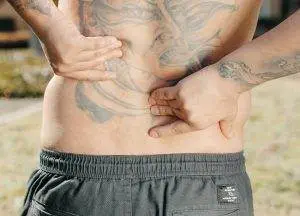
Low back pain, morning stiffness, hip pain? Fatigue, losing weight, poor vision, skin rashes? These can all be signs of Ankylosing Spondylitis (AS). Ankylosing Spondylitis is a type of autoimmune arthritis. Acupuncture can help relieve Ankylosing Spondylitis symptoms like lower back pain.
Ankylosing spondylitis is a chronic inflammatory arthritis condition that most often affects the spine, usually the lower back and pelvis is an inflammatory disease; the primary symptom is inflammation in the sacroiliac joints, the joints where the base of the spine (the ilium) meets the pelvis (the sacrum).
Similar to rheumatoid arthritis (RA), ankylosing spondylitis is an arthritic condition triggered by a person’s immune system mistakenly attacking healthy tissues. Arthritis generally refers to pain and swelling in joint tissues.
Ankylosing spondylitis can also affect the hips, knees, shoulder joints, and/or the ribcage. When the body tries to heal affected bones, extra bone tissue begins to grow. This new bone growth is what causes joint stiffness and lack of flexibility. When the ribs are affected, it can restrict normal breathing.
Ankylosing spondylitis can, over time, weaken bones to the extent that they begin to collapse; these compression fractures can ultimately lead to curvature of the spine and a stooped posture. These fractures of the vertebrae can potentially affect the spinal cord and nerves.
“Ankylosis” is a term for the stiffening and fusion of bones. A “fused spine” can be the eventual outcome of Ankylosing spondylitis.
AS can also cause inflammation in the GI tract, causing gastrointestinal symptoms like diarrhea. In this sense, it is a type of inflammatory bowel disease (IBD).
In some cases, ankylosing spondylitis can cause eye inflammation, leading to vision problems like blurred vision, sensitivity to light, and painful eyes.
AS can also cause inflammation in the heart, which affects the function of the aortic valve and increases risk of heart disease.
As with other autoimmune disorders, modern medicine research has yet to discover what causes Ankylosing Spondylitis. Some gene mutations have been linked to ankylosing spondylitis, which is sometimes called axial spondyloarthritis.
Medical treatment for ankylosing spondylitis helps manage symptoms and slow the progression of the disease.
Acupuncture is widely recognized as an effective adjunct treatment for ankylosing spondylitis that can help reduce pain and improve mobility.
Top 10 Ankylosing Spondylitis Symptoms
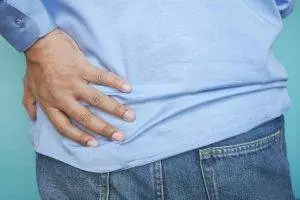
The initial onset of symptoms of ankylosing spondylitis often includes episodes of lower back pain and stiffness or hip pain, which then may get more severe over time. But symptoms can vary widely from person to person, depending on which parts of the body are affected.
Symptoms of Ankylosing Spondylitis include:
- Persistent lower back pain and stiffness, typically worse in the morning and after periods of inactivity; back pain that improves with movement and exercise
- Pain and stiffness that radiate from the lower back to the buttocks, hips, and thighs, reduced flexibility and range of motion in the spine
- Hip pain, shoulder pain, chest pain, rib pain, knee pain, and/or ankle pain
- Difficulty taking deep breaths due to stiffness in the chest and ribcage
- Fatigue
- Bony fusion of vertebrae, leading to a stooped posture and loss of spinal mobility
- Eye inflammation (uveitis) causes eye pain, sensitivity to light, and blurred vision
- Loss of appetite, weight loss
- Psoriasis, skin rash
- Abdominal pain, diarrhea
There is usually a gradual progression of AS symptoms over time, potentially leading to severe spinal deformity and disability.
Conventional treatment, with acupuncture and TCM used as a complementary treatment, can be helpful for symptomatic relief.
Ankylosing Spondylitis Treatment
While there is no cure for AS, conventional medical treatments aim to manage symptoms, prevent complications, and improve quality of life for individuals with the condition.
NSAIDs such as ibuprofen, naproxen, and celecoxib are commonly used to reduce pain and inflammation associated with AS. They can help relieve symptoms and improve mobility, particularly during flare-ups.
Disease-Modifying Antirheumatic Drugs (DMARDs) like sulfasalazine and methotrexate may be prescribed to slow the progression of AS and reduce inflammation. These medications work by suppressing the immune system’s abnormal response, which contributes to inflammation, the formation of extra bone tissue, and damage to the joints.
Biologic drugs, such as tumor necrosis factor (TNF) inhibitors like adalimumab, etanercept, and infliximab, target specific components of the immune system involved in inflammation. They are often prescribed for individuals with moderate to severe AS who do not respond adequately to NSAIDs or DMARDs.
Physical therapy can play a crucial role in the management of AS by helping to improve flexibility, posture, and range of motion. Exercise programs tailored to the individual’s needs can help strengthen muscles, reduce pain, and maintain spinal mobility.
Orthopedic interventions, such as braces and orthotics, may be recommended to support proper posture and prevent spinal deformities caused by AS. In severe cases, surgical procedures like spinal fusion may be considered to stabilize the spine and alleviate pain.
Individuals with AS require regular monitoring by healthcare providers to assess disease activity, monitor medication effectiveness, and detect any complications early. Adjustments to treatment plans may be necessary based on disease progression and individual response to therapy.
Can Acupuncture Help Ankylosing Spondylitis?
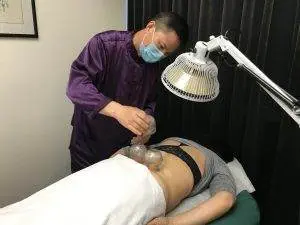
Acupuncture and moxibustion have been used for centuries to help relieve joint pain and stiffness due to inflammation. In Chinese, conditions that might involve bone fusion are called “zhu jie yang,” which means “bamboo spine.”
According to TCM theory, the bones are nourished by the kidney system; we observe that the formation of AS symptoms occurs along the Kidney Meridian and the Governing Vessel meridian. Weakness in bones may be due to deficiency of kidney Qi and blockage of the Governing Vessel.
Painful areas arise when there are blockages in Qi. Blockages occur due to pathogenic forces of phlegm accumulation, cold, and dampness.
Acupuncture treatment, herbs, and moxibustion may be used to strengthen the kidneys, address kidney yang deficiency, and clear dampness and wind from the channels.
One study found that patients who were diagnosed with ankylosing spondylitis and kidney yang deficiency and were given acupuncture treatment and moxibustion focused on the Governing Vessel meridian experienced significant reduction of pain.
Moxibustion warms and invigorates yang energy and can help improve immune function. In the case of AS, this treatment protocol can help slow the progression of the disease, preventing inappropriate bone formation and reducing inflammatory responses.
A review of 26 studies that involved moxibustion treatment as an adjunct therapy for ankylosing spondylitis. The conclusion was that patients who had moxibustion in addition to conventional treatment fared better than those who did not receive moxibustion.
The British Acupuncture Council recommends TCM treatment for AS, as it has been shown to be effective at relieving back pain, without side effects.
One study of patients with ankylosing spondylitis who received acupuncture treatment and Chinese herb supplements, including herbal soak baths, found that people experienced pain relief and functional improvement.
A study that looked at 22 patients who received cupping therapy along with acupuncture and infrared heat lamps. The vast majority of the patients reported significant improvement in their pain symptoms.
Tuina therapeutic massage may also be helpful for helping to improve mobility and circulation.
A review of studies showed that acupuncture offers “unique advantages” in the treatment of ankylosing spondylitis, including localized pain relief, reduced inflammation, improvement of joint mobility, prevention of spinal deformity, and overall better quality of life.
Acupuncture Near Me for Ankylosing Spondylitis in West Los Angeles
Acupuncture can be an effective complementary treatment for many autoimmune disorders, including Sjogren’s disease, Lupus, as well as difficult-to-treat chronic pain conditions like fibromyalgia and complex regional pain syndrome (CRPS). Dr. Tan and Dr. Cai at Art of Wellness in West L.A. have over 35 years of experience helping patients find relief from all kinds of musculoskeletal pain.
*This article is for education from the perspective of Traditional Chinese Medicine only. The education provided by this article is not approved by FDA to diagnose, prevent, treat and cure human diseases. It should not stop you from consulting with your physician for your medical conditions. Traditional Chinese Medicine is based on Qi, which is an invisible force that usually cannot be observed by modern science. Because science focuses on testing ideas about the natural world with evidence obtained through observation, these aspects of acupuncture can’t be studied by science. Therefore acupuncture and Chinese herbs are often not supported by double-blind, randomized trials, and they are considered alternative medicine therapies in the United States.
How to Treat Kidney Stones With Acupuncture and TCM
By Qineng Tan, L.Ac., Ph.D. and Xiaomei Cai, L.Ac., Ph.D.
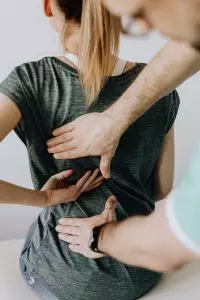
Severe lower back pain, blood in urine, burning pee? These could be signs of kidney stones. Acupuncture and TCM offer an alternative or adjunct kidney stones treatment that can help relieve kidney stone pain and dysuria, or painful urination.
Kidney stones are hard mineral deposits that form in the kidneys or other parts of the urinary tract. Salt and minerals can crystallize when urine reaches a certain level of concentration.
Often, kidney stones form when there are calcium oxalate crystals in urine. Calcium levels can be high because of eating too much sodium.
The ureters are the tubes that connect the kidneys to the bladder. If a kidney stone moves into a ureter and becomes lodged there, it can cause left lower back pain or right lower back pain. This is known as “passing a kidney stone.”
Kidney stones are very common, and many people go to the ER when they are experiencing severe lower back pain on one side and peeing blood. This happens when one or more kidney stones find their way into one of the ureters and become lodged there. This blocks the flow of urine and can cause severe pain and cramping.
Acupuncture can help reduce kidney stone pain in the short term, and help address the imbalances that are the root cause of kidney stones.
What Causes Kidney Stones?

Kidney stones form when there is not enough urine, and it becomes too concentrated. This often is due to not drinking enough fluids and getting dehydrated. Other kidney stone causes include:
- Not drinking enough water, dehydration
- Too much salt
- Too much sugar, fructose, or high fructose corn syrup
- Too much meat, too few fruits and vegetables
- Lack of exercise or too much exercise
- weight loss surgery, bariatric surgery, which can cause chronic diarrhea
- Infections, UTIs
- Gout
- Chronic diarrhea due to Crohn’s disease, ulcerative colitis
- Type 2 Diabetes, high blood sugar levels
Kidney stones are differentiated into different types, depending on their mineral composition. The types of kidney stones are:
- Calcium stones – deposits of calcium oxalate or calcium phosphate
- Uric acid stones – high levels of uric acid can be due to eating a lot of animal proteins
- Struvite stones – can form after a UTI
- Cystine stones – cystinuria is an inherited condition that causes buildup of the amino acid cystine in the urinary tract
Top 10 Symptoms of Kidney Stones
Many people have kidney stones and are not aware of them. It is possible to have kidney stones without pain or kidney stones without urinary symptoms. You may only find out about them when having imaging tests done for some other reason.
However, passing a kidney stone can certainly cause intense pain and other upsetting symptoms. The most common signs of kidney stones include:
- Sharp pain on one side of the lower back
- Cramps in one side
- Pain in the lower abdomen or groin
- Urgent need to pee, urinary urgency
- Peeing a lot, urinary frequency
- Burning sensation when peeing, dysuria
- Dark urine, blood in urine
- Nausea, vomiting
- Pain at the tip of the penis
- Fever and/or chills
Kidney stone pain can range from mild to severe, and it can come and go or be constant.
Acupuncture treatment has been shown to be effective for reducing kidney stone pain when used as an adjunct in emergency medical care settings when someone is waiting for conventional treatment.
Treatment for Kidney Stones
Kidney stones are diagnosed through blood tests and urine tests, which will show if there is too much uric acid, calcium, or other minerals that can cause stones to form. Imaging tests, such as ultrasound, may be able to detect where stones are stuck in the urinary tract.
If a person is passing stones (kidney stones in toilet), they may be analyzed to determine what sort of mineral has formed them.
In many cases, people will be encouraged to wait until the stones pass on their own. In this case, simply drinking adequate fluids and using pain medication to manage the intermittent pain and cramping will be recommended. Medications such as alpha blockers (Flomax) may be prescribed to help relax the ureters.
If the kidney stones are too large to be passed, then surgery may be indicated. Procedures using sound waves are sometimes used to help break up the stones. Surgery using small scopes and instruments can also remove the stones. A stent may be placed in the ureter to help keep it open until swelling goes down and it heals.
Studies have indicated that a combination of medications like Flomax and Chinese herbs may help to expel kidney stones. TCM treatment can help prevent the need for surgery.
Can Acupuncture and Herbs Help Kidney Stones?
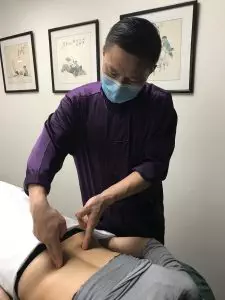
According to TCM theory, kidney stones are in the category of “Shilin” conditions, in which urination is difficult. Chinese herbs have traditionally been used to help balance the electrolyte minerals in the body, which helps prevent stones from forming in the urinary tract.
TCM treatment for kidney stones includes herbal medicine to help increase urine volume and excretion of minerals and inhibits the formation of calcium crystals.
Acupuncture treatment has an anesthetic effect which can help relieve the pain of kidney stones while other treatments take effect to help reduce and prevent the formation of new kidney stones.
One trial found that acupuncture treatment helped relieve kidney stone pain faster than pharmacological medications. Acupuncture treatment has no side effects, while 43% of the people in the study who were given intramuscular anesthesia report side effects like skin rash, irregular heartbeat, and drowsiness.
Acupuncture and acupressure can help relieve severe back pain and pelvic pain due to various urinary and other reproductive system conditions. It can also help reduce the anxiety and depression that people sometimes experience when faced with severe pain.
How to Prevent Kidney Stones
Drinking plenty of water is probably the most important thing you need to do to prevent dehydration and low volume of urine. In addition to staying hydrated, you should:
- Reduce sodium intake by eating less salt and fewer processed and packaged foods.
- Reduce foods that encourage calcium oxalate stones: meats, berries, beer, black pepper, spinach, chocolate/cocoa, and tea.
- Combine calcium-rich foods or drinks with foods that contain oxalate, so that they can be absorbed well together. This could mean eating spinach with cheese, or berries with yogurt. The citrate in citrus juices can also help discourage stone formation.
- Add foods with a high ratio of magnesium to calcium, such as: brown rice, oats, barley, bananas, soybeans, and flaxseeds.
- Be sure to replace lost fluids when you sweat through exercise or by being in a sauna, steam room, or hot tub, or just by being in the heat during the summertime.
- Balance your Ph levels. For some people this may mean increasing alkaline foods. As your acupuncturist about checking your Ph levels.
Acupuncture Near Me for Kidney Stones, Los Angeles
TCM treatment can help reduce pain and address the root causes of many conditions that cause urinary urgency and frequency, like BPH, UTIs, chronic kidney disease (CKD), and interstitial cystitis. Acupuncture can also help relieve pelvic pain and low back pain due to many other conditions, like endometriosis, and mittelschmerz. If you are experiencing urinary symptoms or recurring bladder pain or back pain, consider consulting an experienced acupuncture practitioner to resolve the root issue.
*This article is for education from the perspective of Traditional Chinese Medicine only. The education provided by this article is not approved by FDA to diagnose, prevent, treat and cure human diseases. It should not stop you from consulting with your physician for your medical conditions. Traditional Chinese Medicine is based on Qi, which is an invisible force that usually cannot be observed by modern science. Because science focuses on testing ideas about the natural world with evidence obtained through observation, these aspects of acupuncture can’t be studied by science. Therefore acupuncture and Chinese herbs are often not supported by double-blind, randomized trials, and they are considered alternative medicine therapies in the United States.
How to Treat Dysmenorrhea With Acupuncture and TCM
By Xiaomei Cai, L.Ac., Ph.D. & Qineng Tan, L.Ac., Ph.D.

Menstrual cramps, unbearable period pain? Severe period cramps and period back pain are dysmenorrhea symptoms. Acupuncture and TCM offer a way to help with cramps and provide period cramp relief.
About 80% of women report having menstrual cramps and painful periods at some point in their lives. Over 40% of women regularly experience PMS cramps, or cramps before period. For some women, the pain is mild enough to tolerate. For others, severe period cramps are truly debilitating, leading to missed days of school or work.
Primary dysmenorrhea is when the period cramps are a result of prostaglandins (hormones) causing the uterus to contract forcefully to expel its lining. For some people, this action leads not only to pelvic pain, but can radiate to cause severe lower back pain, hip pain, or even pain in the legs.
Secondary dysmenorrhea is when severe menstrual cramps are related to another condition, such as endometriosis, uterine fibroids, or pelvic inflammatory disease (PID). About 1 in 10 women between the ages of 15-49 experiences endometriosis, which can cause excruciating pelvic pain during period, and negatively impact fertility. As many as 60-80% of women have fibroids, although many do not know it.
The severe period cramps may feel like a constant ache in the lower abdomen, or more like a gripping or throbbing pain that comes and goes.
Acupuncture and TCM offer an alternative way to treat period cramps and get period pain relief.
Top 5 Dysmenorrhea Symptoms
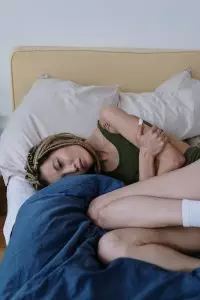
In addition to menstrual cramps and back pain during the period, some women experience other symptoms of dysmenorrhea, including:
Some women also experience vaginal cramps or ovary pain during period. This may be due to inflammation or scar tissue around the ovaries or ovarian cysts swelling.
How to Help Period Cramps
Generally, doctors will treat dysmenorrhea OTC pain medication, or NSAIDs like Ibuprofen, to relieve menstrual cramping due to primary dysmenorrhea. They may prescribe hormonal birth control, such as oral contraceptives (birth control pills), birth control patch, birth control implant, injection, or vaginal ring.
Hormonal birth control helps relieve period pain because it blocks ovulation and reduces the amount of prostaglandins being produced. However, this medication is not particularly helpful for those who may wish to get pregnant, or those who experience unpleasant side effects from birth control.
Possible Side Effects of Hormonal Birth Control
Many people may find that hormonal birth control causes side effects such as:
Potentially serious side effects may be more common the older a woman is, or the longer she remains on birth control; these could include: blood clots, gallbladder disease, heart disease, or even stroke.
If severe menstrual cramps are not relieved with pain medication, further investigation may be done to determine if there is some other condition causing pelvic pain.
Endometriosis is also usually treated with pain medications and contraceptives, or with Nupron, which suppresses the period. In severe cases, surgery may remove the patches of endometrial tissues. However, with both of these treatments, the endometriosis and severe period pain often come back.
Birth control, pain medications, and even surgeries may temporarily reduce painful cramps, but they are only masking the deeper problems. TCM and acupuncture can help get rid of menstrual cramps because they address the root cause of the pain.
Can Acupuncture Help Get Rid of Period Cramps?

In TCM, we look at organ systems as working together in harmony. Pain usually occurs because there is some imbalance in one or more of the major organ systems. Dysmenorrhea is usually considered to be related to Qi and/or blood stagnation, and often a deficiency of the kidney, liver, or both. In TCM, the liver controls the storage and distribution of blood, so it is central to the process of menstruation.
Dampness and cold are pathogenic forces that can be disruptive to the smooth flow of Qi related to menstruation. Being in a cold, damp place or eating too many cold or damp foods can cause blood stagnation in the abdominal area that leads to painful cramps.
Emotions can also play a significant role, as in TCM we see feelings of anger or depression causing liver stagnation. Deficiency of Qi can happen when a woman has gone through a lot, emotionally and physically, possibly through giving birth, or having stresses put on the reproductive organs.
Scientific research has shown that acupuncture has an effect on the production of key hormones like serotonin, estrogen and progesterone. When we use acupuncture points to balance the function of the liver, kidney, and other organ systems, these chemical changes occur naturally. We also use herbs to get vital nutrients into the blood that we can’t get from food.
Acupuncture is effective for treating conditions like endometriosis, uterine fibroids, and PCOS, as well.
Acupuncture treatment and herbal remedies for endometriosis and fibroids have been shown to reduce prostaglandin levels, which helps to relieve painful cramping and also to regulate cycles.
A study of endometriosis patients with dysmenorrhea who received electroacupuncture, the cure rate was 94.4% with low recurrence at the one-year checkup. Another study found that auricular acupuncture was effective 91% for mild to moderate menstrual pain.
TCM herbal formulations have been shown to be highly effective at relieving period pain. They work on the TCM principles of removing blood stasis to reduce swelling and relieve painful cramps.
When we are working to influence the menstrual cycle—in this case, to relieve painful cramping—it is usually best to have acupuncture treatment regularly for about three months. This way, we have time to balance the hormone fluctuations that occur during each phase of the cycle.
Top 3 Tips for Natural Relief from Period Cramps
Your acupuncturist can help give you personalized nutrition advice to help with your unique situation. Most people who are having trouble with painful periods can help themelves by trying these tips:
- Get more Omega-3 fatty acids in your diet – good natural sources include fish, flax seeds, and walnuts. You can also try taking fish oil, cod liver oil, or a vegan omega-3 supplement.
- Reduce consumption of ice-cold foods and beverages – icy drinks, ice cream, and raw foods can all cause a cooling of the uterus, which contributes to painful cramps.
- Avoid mucus-producing foods – foods that are more difficult to digest lead to mucus and stagnation in the organs. Reduce fatty foods, fried foods, and red meat.
Acupuncture Near Me for Dysmenorrhea in Los Angeles, Santa Monica
TCM has been used to treat menstrual difficulties and all types of gynecological issues for many centuries. The doctors at Art of Wellness in West L.A. bring special expertise in both TCM and western medicine gynecology and have partnered with the top women’s health and fertility specialists in Los Angeles. We have over 30 years of experience helping people regulate their menstrual cycles and experience more comfortable periods.
*This article is for education from the perspective of Traditional Chinese Medicine only. The education provided by this article is not approved by FDA to diagnose, prevent, treat and cure human diseases. It should not stop you from consulting with your physician for your medical conditions. Traditional Chinese Medicine is based on Qi, which is an invisible force that usually cannot be observed by modern science. Because science focuses on testing ideas about the natural world with evidence obtained through observation, these aspects of acupuncture can’t be studied by science. Therefore acupuncture and Chinese herbs are often not supported by double-blind, randomized trials, and they are considered alternative medicine therapies in the United States.
How To Help Dependence on Hydrocodone and Other Opioid Pain Medication With Acupuncture and TCM
By Qineng Tan, L.Ac., Ph.D. & Xiaomei Cai, L.Ac., Ph.D.
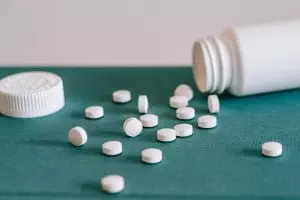
Many people are prescribed strong pain medication when they are in need of pain relief. Opioid drugs may help relieve pain, but they can also create a physical dependence as a person develops a tolerance for the painkillers. Acupuncture and TCM offer an alternative to opiate drugs and opioids like Codeine and Vicodin for treating pain, and a way to help treat both opioid dependence and addiction.
We often hear in the news that the U.S. is facing an “opioid epidemic.” Recent statistics suggest that over ten million Americans may have an opioid use disorder. CDC data showed that over 75,000 people died from opioid overdoses in 2021.
Some of the most commonly used pain medications include:
- Oxycodone (Oxycontin)
- Hydrocodone (Vicodin)
- Oxymorphone
- Morphine
- Methadone
- Fentanyl
- Codeine
- Tramadol
- Buprenorphine
Opioid medications are also known as “narcotics.” “Opiate” drugs are derived naturally from the poppy plant. These include: opium, codeine, and heroin. “Opioids” are synthetically produced in a lab. These include: oxycodone and fentanyl.
People are prescribed opioids or opiates to help them deal with severe pain, but the medications themselves can then become the primary cause of suffering in their lives. Roughly a quarter of people who are prescribed opioid pain medications end up misusing them.
Opioid misuse can mean different things, like: taking more than the prescribed dosage, using someone else’s medication, or continuing to take the medication even though it is having a negative impact on your health and life.
Dependence on opioids is different from addiction, and it is possible to experience drug dependence with or without also having a substance use disorder.
When a person becomes dependent on a medication, it means that they require a certain dose of that substance in order to avoid withdrawal symptoms. This is why these medications are closely monitored by the prescribing medical doctor, so that the dosage is carefully controlled. A person may need to be slowly weaned off the medications when they are no longer necessary, so as to avoid withdrawal.
It is also possible for a person to develop an addiction to opioids, as they stimulate the release of endorphins, which help to block pain signals and produce positive feelings. When this process is repeated over and over, the body starts producing less endorphins naturally, and a higher dosage of the opioid medication is required to produce the same effect; this is what we mean by “tolerance” to the drug.
Addiction to opioids—or an opioid use disorder—is more likely the longer a person takes them—for example, for a chronic pain condition. Other factors, like depression or anxiety, high levels of stress at work or home, and use of other substances like tobacco and alcohol, can also play a role in addiction risk.
It can be difficult, even for doctors, to distinguish between physical dependence and addiction. Addiction is usually defined by “abuse” or “misuse.” When a person feels that they cannot live without the medication, though, there is clearly a problem.
Acupuncture and TCM may play an important role in helping both individuals, and society as a whole, overcome dependence on opioid pain medications because it addresses the problem in several ways.
Top 10 Reasons Acupuncture Is a Good Alternative to Opioids for Pain Relief

Acupuncture has a natural analgesic effect and can help relieve severe pain and chronic pain, without negative side effects.
- Acupuncture and other TCM modalities are an effective alternative for pain relief.
- Acupuncture can be used to treat both acute pain and chronic pain.
- Acupuncture can help reduce the need for opioid-like medications after surgeries, by helping relieve postoperative pain.
- Acupuncture and herbs can help postoperative wounds heal more quickly.
- Acupuncture can help cancer patients by providing pain relief and additionally helping to relieve nausea and mitigating other side effects of cancer treatment.
- Acupuncture provides pain relief without negative side effects.
- Acupuncture can help individuals who are trying to stop taking opiates avoid withdrawal symptoms.
- Acupuncture can help alleviate cravings for addictive substances.
- Acupuncture helps to effect the release of endorphins naturally, which provides the same good feelings as drugs initially do.
- Acupuncture can be a more cost effective way to treat pain and addiction than other methods.
Treatment for Opioid Dependence
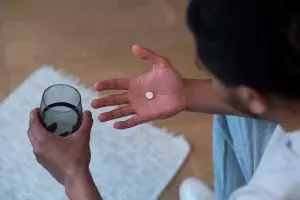
Methadone Maintenance treatment (MMT) is widely used to treat opioid addiction or dependence. This method involves replacing the opioid drug with methadone, which is a synthetic opioid, so it acts on the same centers of the brain, which helps to reduce cravings and withdrawal symptoms. This can help people wean themselves off of pain medications or heroin. However, there can be side effects, and MMT does not help everyone stop using or misusing opiates or prescription pain medications.
Long-term use of opioids can be detrimental to a person’s overall health, both mentally and physically. Hydrocodone side effects and oxycodone side effects can include: drowsiness, dizziness, nausea, vomiting, constipation, irregular heartbeat, and increased risk of respiratory problems for people with asthma or COPDs like emphysema or chronic bronchitis.
Mental health issues and opioid misuse often go together. People who suffer from depression or anxiety are much more likely to use opioids to treat pain and then become emotionally dependent on them.
Overall, evidence suggests that pharmacological methods for treating opioid misuse are not very successful. TCM and acupuncture offer an alternative treatment for opioid dependence.
Can Acupuncture Help Relieve Pain Better Than Opioids?
While there is still much to be done in the way of scientific research to demonstrate exactly how acupuncture is able to effect changes in the body and help relieve pain, there is ample enough evidence to convince the medical community that acupuncture does, indeed, have a significant analgesic effect. For two decades now, the WHO has recommended acupuncture and TCM for many different pain conditions, including:
- neck pain
- back pain
- low back pain
- Sciatica, hip pain
- postoperative pain
- headaches and migraines
- shoulder pain
- heel pain, plantar fasciitis
- TMJ pain
- Neuropathy pain
Acupuncture may work so well to relieve pain because it appears to have an effect on the central nervous system and opioid peptide neurotransmitters, including endorphins. This means that acupuncture works on the opioid receptors in the brain.
One study of patients who were in methadone treatment for opioid dependence found that people who received acupuncture were able to reduce the amount of methadone they needed.
A study on patients who had lumbar spine surgery to help severe back pain showed that acupuncture worked well as a postoperative analgesic.
Acupuncture Near Me for Pain Management and Opioid Dependence in Los Angeles
It is absolutely necessary for so many people to find pain relief when they have an acute condition, or a chronic pain condition, or are in treatment for cancer or other serious illness. Serious pain causes mental anguish as well as physical limitations. Acupuncture and TCM offer an alternative treatment for pain management that helps not only to block pain, but also to relieve stress and anxiety. At Art of Wellness, we have over 30 years of experience helping people to manage pain safely and effectively.
*This article is for education from the perspective of Traditional Chinese Medicine only. The education provided by this article is not approved by FDA to diagnose, prevent, treat and cure human diseases. It should not stop you from consulting with your physician for your medical conditions. Traditional Chinese Medicine is based on Qi, which is an invisible force that usually cannot be observed by modern science. Because science focuses on testing ideas about the natural world with evidence obtained through observation, these aspects of acupuncture can’t be studied by science. Therefore acupuncture and Chinese herbs are often not supported by double-blind, randomized trials, and they are considered alternative medicine therapies in the United States.